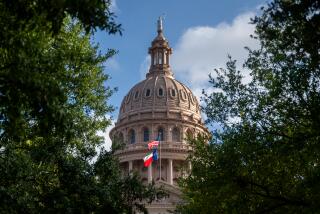Special Interests Behaving as if There <i> Is </i> a Free Lunch
- Share via
The anguish spawned around the country during negotiations between the President and Congress over ways to cut Washington’s budget deficit leads me to wonder if people realize just where the funds come from.
There are many who think that government money--especially federal money--comes from some mysterious, inexhaustible source. At least that’s the way it seems to me, in view of the arguments they pose against cutting their special-interest programs.
It’s almost as though they think that they have a right to tap the public well, since isn’t that what it is there for?
I have what might be shocking news for these people: There are only two ways in which the federal government can get money to spend. One is to tax, the other to borrow. Together, they make up the true burden that the government imposes on the economy, for they add up to total government spending.
Because both methods involve the private sector giving up purchasing power to the public sector, what these special interests would have elected officials do to continue funding their programs is to maintain--or even enlarge--the burden of government on the economy so that their particular interests can be satisfied.
To be sure, most pressure groups recognize the need to reduce Washington’s budget deficit. Indeed, they are usually among the first to advocate tightening belts--as long as they’re someone else’s, not theirs.
It’s been quite a spectacle, watching the corridors of Capitol Hill--otherwise known as Gucci Gulch--fill up with lobbyists representing scores of special-interest groups, ranging from senior citizens to various industries, social welfare agencies and educational institutions.
Their arguments are compelling. They want to “fight the unnecessary and unwise destruction of the social and economic advances of the past 50 years,” in the words of one. “Americans must tell the President and the Congress that they will not sit still for reactionary tax increases,” cried another.
The defense establishment has not acted differently. Military personnel regularly remind legislators that the relaxation of tensions between the Soviet Union and the United States does not mean that we can dismantle our defenses: Witness the crisis in the Mideast.
All of the hand-wringing, the beseeching looks toward Washington and the cries that the government should not stop pouring federal money into various special-interest programs means that these people want one or more of three things. First, Washington should raise taxes to get the money to pay for their programs. Second, it should borrow more from the private sector--raising interest rates in the process. Or, third, it should borrow from the Federal Reserve--raising prices instead.
There is no other way. There is no such thing as a free lunch.
Let’s examine each of these “options” closely. Former Supreme Court Justice John Marshall said the power to tax involves the power to destroy. By that criterion we have done more damage to ourselves than any foreign nation has done to us in any war.
Our federal tax burden today is about equal to the high point reached nine years ago.
This mounting burden has slowly but surely reduced our ability to grow. In the past 10 years, the real gross national product has expanded at a 2.5% annual rate--down from 3% in the 1970s and 4% in the 1960s.
That leaves borrowing. Here the tab has risen even faster. In the fiscal year just ended, Washington raised nearly $400 billion to finance its reported deficit of $220 billion and to roll over its previously issued debt. This was equal to nearly all the savings generated economy-wide; it compares to 80% of savings in 1980, 40% in 1970 and 15% in 1960.
Washington’s debt outstanding now equals almost 60% of GNP--the highest in more than 30 years. Then, interest rates on Treasury bills averaged 3%; today, rates are more than double that.
Of course, Washington could borrow from abroad. This avenue not only leads to higher interest rates but also to a stronger dollar as well. An overvalued dollar hurts U.S. exporters and encourages imports, thereby harming other U.S. goods producers as well.
If Washington were to borrow from the Federal Reserve, it would have the effect of creating more money. Since the budget deficit has been growing faster than the economy, such borrowing would force the central bank to create money at a faster rate than the goods and services we are turning out.
When money in circulation grows faster than goods and services, it tends to lose value. In other words--we experience inflation, and this, as you know, robs all of us of our buying power.
Therefore, when the special interest groups advocate that Washington continue to pour federal money into their programs, they are in effect saying:
* The federal government should raise taxes on those who have to give to those who have not.
* Washington should borrow either from our domestic markets or from abroad to give to those who are unable to borrow on their own.
* The federal government should further erode the value of the dollar through more inflation to transfer buying power from one group to another.
There is no other way. There is no such thing as a free lunch.
More to Read
Get the L.A. Times Politics newsletter
Deeply reported insights into legislation, politics and policy from Sacramento, Washington and beyond. In your inbox twice per week.
You may occasionally receive promotional content from the Los Angeles Times.









